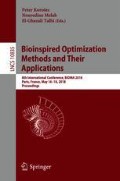Abstract
We propose a general solution method framework based on a Collaborative Agent Teams (CAT) architecture to tackle large-scale mixed-integer optimization problems with complex structures. This framework introduces several conceptual improvements over previous agent teams’ approaches. We discuss how to configure the three key components of a CAT solver for multidimensional optimization problems: the problem representation, the design of agents, and the information sharing mechanisms between agents. Implementation guidelines are also given.
Access this chapter
Tax calculation will be finalised at checkout
Purchases are for personal use only
References
Murthy, S., Akkiraju, R., Goodwin, R., Keskinocak, P., Rachlin, J., Wu, F.: Cooperative multiobjective decision support for the paper industry. Interfaces 29(5), 5–30 (1999)
Carle, M.A., Martel, A., Zufferey, N.: The CAT metaheuristic for the solution of multi-period activity-based supply chain network design problems. Int. J. Prod. Econ. 139(2), 664–677 (2012)
Silver, E., Zufferey, N.: Inventory control of an item with a probabilistic replenishment lead time and a known supplier shutdown period. Int. J. Prod. Res. 49, 923–947 (2011)
Hertz, A., Schindl, D., Zufferey, N.: Lower bounding and tabu search procedures for the frequency assignment problem with polarization constraints. 4OR 3(2), 139–161 (2005)
Zufferey, N.: Heuristiques pour les Problèmes de la Coloration des Sommets d’un Graphe et d’Affectation de Fréquences avec Polarités. Ph.D. thesis, École Polytechnique Fédérale de Lausanne (EPFL), Switzerland (2002)
Michel, L., Hentenryck, P.V.: A simple tabu search for warehouse location. Eur. J. Oper. Res. 157, 576–591 (2004)
Melab, N., Talbi, E.G., Cahon, S., Alba, E., Luque, G.: Parallel metaheuristics: models and frameworks. Parallel Combinatorial Optimization, p. 330. Wiley, Hoboken (2006)
Talbi, E.G.: A taxonomy of hybrid metaheuristics. J. Heuristics 8(5), 541–564 (2002)
Blum, C., Puchinger, J., Raidl, G., Roli, A.: Hybrid metaheuristics in combinatorial optimization: a survey. Appl. Soft Comput. 11, 4135–4151 (2011)
Raidl, G.R., Puchinger, J.: Combining (Integer) linear programming techniques and metaheuristics for combinatorial optimization. In: Blum, C., Aguilera, M.J.B., Roli, A., Sampels, M. (eds.) Hybrid Metaheuristics. SCI, vol. 114, pp. 31–62. Springer, Heidelberg (2008). https://doi.org/10.1007/978-3-540-78295-7_2
Maniezzo, V., Stuetzle, T., Voß, S.: Matheuristics: Hybridizing Metaheuristics and Mathematical Programming. Springer, Heidelberg (2009). https://doi.org/10.1007/978-1-4419-1306-7
Dantzig, G.B., Wolfe, P.: Decomposition principle for linear programs. Oper. Res. 8, 101–111 (1960)
Benders, J.F.: Partitioning procedures for solving mixed variables programming problem. Numer. Math. 4, 238–252 (1962)
Walshaw, C.: Multilevel refinement for combinatorial optimization problems. Ann. Oper. Res. 131, 325–372 (2004)
Melo, M., Nickel, S., da Gama, F.S.: An efficient heuristic approach for a multi-period logistics network redesign problem. TOP 22, 80–108 (2014)
Thanh, P., Péton, O., Bostel, N.: A linear relaxation-based heuristic approach for logistics network design. Comput. Ind. Eng. 59, 964–975 (2010)
Schneeweiss, C.: Distributed Decision Making, 2nd edn. Springer, Heidlberg (2003). https://doi.org/10.1007/978-3-540-24724-1
Talukdar, S., Murthy, S., Akkiraju, R.: Asynchronous teams. In: Handbook of Metaheuristics. Kluwer Academic Publishers (2003)
Keskinocak, P., Wu, F., Goodwin, R., Murthy, S., Akkiraju, R., Kumaran, S.: Scheduling solutions for the paper industry. Oper. Res. 50(2), 249–259 (2002)
Aydin, M., Fogarty, T.: Teams of autonomous agents for job-shop scheduling problems: an experimental study. J. Intell. Manuf. 15, 455–462 (2004)
Ratajczak-Ropel, E.: Experimental evaluation of the A-team solving instances of the RCPSP/max problem. In: Jędrzejowicz, P., Nguyen, N.T., Howlet, R.J., Jain, L.C. (eds.) KES-AMSTA 2010. LNCS (LNAI), vol. 6071, pp. 210–219. Springer, Heidelberg (2010). https://doi.org/10.1007/978-3-642-13541-5_22
Nagy, G., Salhi, S.: Location-routing: issues, models and methods. Eur. J. Oper. Res. 177, 649–672 (2007)
Beasley, J.E.: Lagrangean heuristics for location problems. Eur. J. Oper. Res. 65, 383–399 (1993)
Cordeau, J.F., Laporte, G.: Tabu search heuristics for the vehicle routing problem. In: Sharda, R., Voß, S., Rego, C., Alidaee, B. (eds.) Metaheuristic Optimization via Memory and Evolution: Tabu Search and Scatter Search, pp. 145–163. Springer, Heidelberg (2005). https://doi.org/10.1007/0-387-23667-8_6
Wu, T.H., Low, C., Bai, J.W.: Heuristic solutions to multi-depot location-routing problems. Comput. Oper. Res. 29, 1393–1415 (2002)
Zufferey, N.: Optimization by ant algorithms: possible roles for an individual ant. Optim. Lett. 6(5), 963–973 (2012)
Achterberg, T., Berthold, T.: Improving the feasibility pump. Discrete Optim. 4, 77–86 (2007)
Danna, E., Rothberg, E., Pape, C.L.: Exploring relaxation induced neighborhoods to improve MIP solutions. Math. Program. Ser. A 102, 71–90 (2005)
Ball, M.: Heuristics based on mathematical programming. Surv. Oper. Res. Manag. Sci. 16, 21–38 (2011)
Author information
Authors and Affiliations
Corresponding author
Editor information
Editors and Affiliations
Rights and permissions
Copyright information
© 2018 Springer International Publishing AG, part of Springer Nature
About this paper
Cite this paper
Carle, MA., Martel, A., Zufferey, N. (2018). Collaborative Agent Teams (CAT): From the Paradigm to Implementation Guidelines. In: Korošec, P., Melab, N., Talbi, EG. (eds) Bioinspired Optimization Methods and Their Applications. BIOMA 2018. Lecture Notes in Computer Science(), vol 10835. Springer, Cham. https://doi.org/10.1007/978-3-319-91641-5_6
Download citation
DOI: https://doi.org/10.1007/978-3-319-91641-5_6
Published:
Publisher Name: Springer, Cham
Print ISBN: 978-3-319-91640-8
Online ISBN: 978-3-319-91641-5
eBook Packages: Computer ScienceComputer Science (R0)

